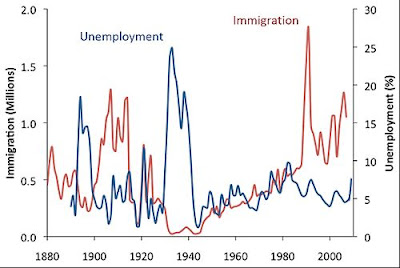Michael Clemens gives clear perspectives on why hiring restrictions for those on H1-B visas is bad for the US economy. A clear-cut piece!
First, the lesson of America’s long history is that there is simply no tradeoff between immigration and the job opportunities of people already here—even in times of crisis. Let’s dump the soundbites and stare directly at our experience as a nation. Below is a graph I created from primary statistical sources listed at the end of this post. It shows U.S. immigration since 1880, superimposed on a graph of U.S. unemployment from 1890 through two weeks ago:

These numbers are remarkable. Collapses in immigration utterly failed to keep Americans at work during the major depressions of the 1890s and 1930s. Enormous surges in immigration accompanied falling unemployment in the early 1900s and after 1981. If you still think that the big picture of U.S. history involves any sort of tradeoff between immigration and unemployment, it’s time to re-envision our stunningly dynamic, flexible economy. Non-partisan research from thinktanks and academia shows that highly skilled workers, in particular, create new jobs for others when they enter the United States—both by helping existing companies grow (pdf) and by starting new companies. Bill Kerr of Harvard Business School also shows that immigrants play an important role in U.S. innovation in science and technology, finding in a recent study “that in periods when H-1B visa numbers went down, so did patent applications filed by immigrants [in the U.S.]. And when H-1B visa numbers went up, patent applications followed suit.”
Second, the two Senators responsible for the anti-immigration provision of the stimulus bill—Chuck Grassley and Bernie Sanders—didn’t write it to help American workers through the crisis. Both of them represent states (Iowa and Vermont) where hardly any of our highly skilled foreign workers go. Grassley was working hard to restrict the number of high-skill workers entering on H-1B visas, with help from Sanders, back in 2007. Back then there was not a glimmer of the layoffs we’ve seen recently. Back then the economy was so hot that tech companies were being starved of qualified workers by caps on H-1B visas, caps that Bill Gates pleaded Congress to raise. Today’s crisis has simply given longtime nativists a cherished chance to impose their will on other people by force. In this case those other people are intelligent and highly skilled workers, mostly from developing countries, whose unlucky birthplace bars them from spectacularly high-paying opportunities that nativists prefer to see as their exclusive and heaven-ordained right.
Third, restricting access to the United States for smart, highly educated, energetic workers is bad for development. International connections among skilled workers have been important to the engines of growth and poverty reduction that have arisen in several developing countries over the past few decades. Sociologist AnnaLee Saxenian has documented the myriad unpredictable ways that skilled Indian and Chinese workers abroad helped high-tech industries to form in their home countries, thereby raising the returns to education even for people who don’t wish to leave. The same Bill Kerr mentioned above has shown that skilled migrants abroad raise knowledge transfer to, and manufacturing output in, developing countries of origin. A growing research literature suggests that highly skilled workers abroad can generate new trade and new investment for developing countries, and even help foster democratic institutions in developing countries—to say nothing of the money they send home, often to families whose economic deprivation cannot be imagined by most Americans in their darkest moments. If you believe that restricting skilled-worker migration is a positive force for development, pick a ghetto or impoverished rural county in the United States and ponder the economic and ethical consequences of trapping smart young people in that place with forcible travel restrictions.
It’s not surprising that the U.S. is sprouting more protectionists in this time of crisis. Fighting this destructive tendency is all the more noble when times are tough. As the crisis continues, let us not take another step down the lose-lose road of isolation. Rather, let us see this moment in history as an opportunity to reform broken immigration systems in the rich world, recognizing that pro-development migration policies, some of which I outline in my chapter on migration in The White House and the World, will make poor and developed countries alike more prosperous in the end.
See this one as well.